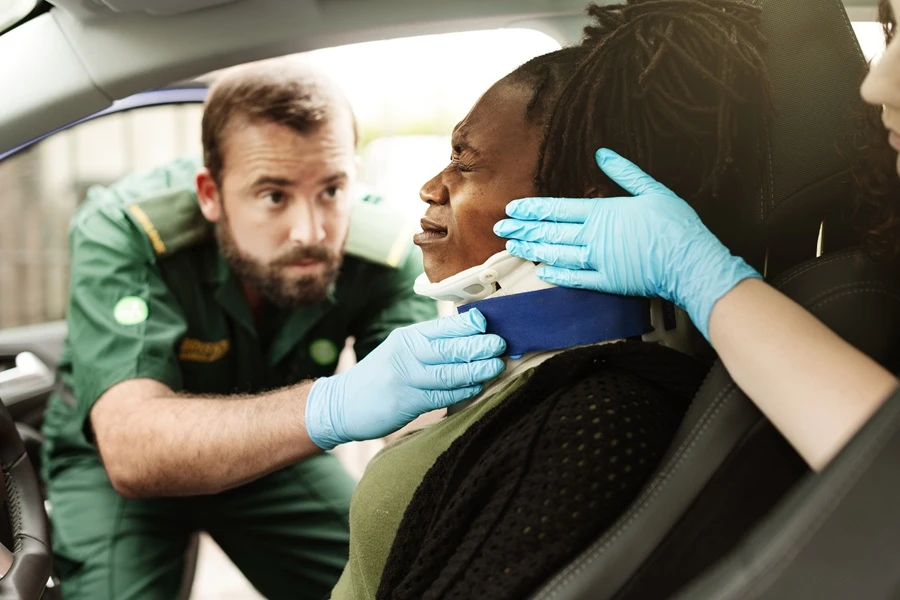There is no fee unless we win!
EN

- EN
- ES


The body's stress response during an auto accident releases adrenaline and endorphins that can mask pain and injury symptoms. This natural reaction, while protective in the moment, can prevent accident victims from recognizing serious conditions that require immediate medical attention. What seems like minor soreness could signal traumatic brain injury, internal bleeding, or spinal cord damage.
In this blog post, our trusted car accident lawyers serving Washington will explain the most common hidden injuries you should watch for after a car crash.

When a driver or passenger is involved in a car crash, they often strike their knee on the dashboard. This direct impact can cause serious injuries, and the pain isn't always immediate. Here are some of the potential injuries that can lead to delayed knee pain:
Whiplash occurs when the head and neck are violently jerked back and forth during impact, commonly in rear-end collisions. This sudden motion can damage muscles, ligaments, tendons, and nerves in the neck and upper spine.
Signs of whiplash and neck injury include:
Many people dismiss neck pain as minor soreness, but untreated whiplash can cause chronic pain lasting months or years. The soft tissue damage from whiplash may not be visible on X-rays, making a proper medical evaluation necessary for accurate diagnosis.

Traumatic brain injury (TBI) represents one of the most serious hidden injuries after a car crash. Even without direct head impact, the sudden acceleration and deceleration forces can cause the brain to collide with the skull, resulting in a concussion or more severe brain injuries.
Delayed symptoms of traumatic brain injury include:
Brain injuries often don't show up on standard imaging immediately after an accident. The delayed onset of symptoms can occur days or weeks later as brain swelling develops. Without proper medical evaluation and treatment, traumatic brain injury can lead to permanent cognitive impairment and long-term complications.
Blunt force trauma from car accidents can cause internal injuries to organs without visible external wounds. Internal bleeding is particularly dangerous because symptoms may not appear until significant blood loss has occurred.
Warning signs of internal bleeding include:
Internal bleeding can be life-threatening if not detected early. Damage to organs like the liver, spleen, or kidneys requires immediate emergency medical care. Even minor internal bleeding can worsen without proper treatment, making prompt medical evaluation after any car accident important.
Spinal injuries can occur anywhere along the spine, from the neck (cervical) to the lower back (lumbar). The force of impact can compress vertebrae, herniate discs, or damage the spinal cord itself. These injuries can lead to long-term chronic pain and mobility issues. If your condition is permanent and prevents you from working, it may be classified as a disabling condition.
Symptoms of spinal cord injury include:
A herniated disc occurs when the soft center of a spinal disc pushes through its outer ring, potentially pressing on nearby nerves. This condition can cause chronic pain and mobility issues that significantly impact quality of life if left untreated.
Car accidents are traumatic events that can have lasting psychological effects. Post-traumatic stress disorder (PTSD) is a serious mental health condition that develops after experiencing or witnessing a traumatic event like an auto accident.
Emotional symptoms of PTSD include:
PTSD can affect personal relationships, work performance, and overall quality of life. Mental health treatment is just as important as addressing physical symptoms after a car accident. Professional counseling and therapy can help accident victims process trauma and develop coping strategies.

Deep vein thrombosis (DVT) occurs when blood clots form in deep veins, typically in the legs. Car accidents can increase the risk of blood clot formation through direct trauma to blood vessels, prolonged immobility during recovery, or as a complication of other injuries.
Signs of deep vein thrombosis include:
Blood clots are particularly dangerous because they can break loose and travel to the lungs, causing a pulmonary embolism, a potentially fatal medical emergency. Symptoms of pulmonary embolism include sudden shortness of breath, chest pain, rapid heartbeat, and coughing up blood.
Soft tissue injuries affect muscles, tendons, and ligaments throughout the body. These injuries to soft tissues may not cause immediate pain but can develop into chronic conditions without proper treatment.
Common soft tissue injuries include:
Soft tissue damage can occur in the back, shoulders, arms, and legs. The injury symptoms may be mistaken for normal post-accident soreness, but persistent or worsening pain indicates the need for medical evaluation. Physical therapy and proper treatment can prevent soft tissue injuries from becoming chronic pain conditions.

Car accidents can cause unexpected neurological symptoms that victims and even medical professionals might initially overlook. One surprising example is persistent hiccups after a car accident.
Unusual neurological symptoms may include:
Persistent hiccups, while seemingly minor, can indicate damage to the phrenic nerve or brain injury affecting the medulla oblongata. This type of nerve damage can result from trauma to the neck, chest, or head during the accident. Any unusual symptoms following a car crash deserve medical attention, as they may signal serious underlying injuries.
Hidden injuries pose unique risks because:
The body's natural stress response can mask pain for 24-48 hours or longer after an accident. What feels like minor discomfort initially can indicate serious conditions requiring immediate medical care.

Recognizing injury symptoms is one of the most critical steps to take immediately after an accident. Not all injuries are obvious, however, and the following symptoms are a sign that you should seek medical attention to diagnose a hidden injury:
Any of these car accident trauma symptoms could indicate a serious hidden injury. Early diagnosis is the key to a solid recovery. Additionally, if you delay seeking treatment, it could be more difficult for your car accident lawyer to argue that these injuries were from the wreck.
Injuries from car accidents should not be taken lightly. If you're suffering pain and other car accident after effects (like the symptoms listed above), it's important to see a doctor immediately.

Here are some tips for taking care of yourself after an auto accident:
These are commonly recommended treatments, but your doctor's directions are the best course of action.
Hidden injuries after car accidents can be just as serious as immediately apparent trauma. From traumatic brain injury and spinal cord damage to blood clots and PTSD, these delayed symptoms require prompt medical attention and proper treatment.
Our Seattle car accident attorneys at Lehmbecker Law can properly value your auto accident claim to determine how much compensation you're eligible for. We'll help you avoid lowball insurance offers and do everything we can to reclaim the full compensation that you're entitled to. To schedule a complimentary initial consultation, contact us today.

Contact Lehmbecker Law's Washington car accident attorneys today for a free consultation. We'll evaluate your case, explain your rights, and fight for the compensation needed to cover medical treatment, long-term care, and the pain you’ve experienced.